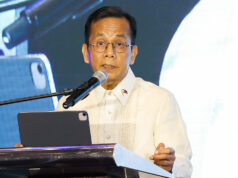House may start Charter debates next week
CONGRESSMEN could start debates on proposed economic changes to the 1987 Constitution on Monday next week after a committee endorsed these to the House of Representatives plenary.
“We might start plenary debates on Feb. 15,” Party-list Rep. Alfredo A. Garbin, Jr., who heads the committee on constitutional amendments, said in a Viber message on Sunday.
The House body on Tuesday adopted a resolution allowing Congress to lift restrictive economic provisions of the 1987 Constitution supposedly to help the Philippine economy recover amid a coronavirus pandemic.
Lawmakers agreed to insert the phrase “unless otherwise provided by law” in parts of the Charter that limit foreign ownership in certain Philippine industries, according to a statement posted on the House website last week.
This will allow Congress to pass a law later relaxing ownership limits.
Lawmakers agreed not to touch a section of the basic law that bars foreigners from owning land, the House said.
The changes will be made under three articles on the national patrimony and economy; education, science and technology; and general provisions, for a total of seven changes.
The voting coincided with the 34th anniversary of the ratification of the 1987 Constitution, which Mr. Garbin described as a “living Constitution” that is “far from being perfect.”
He said the changes would allow the Legislature to change time-bound laws that have been enshrined in the Constitution.
Mr. Garbin said this week, the House committee on rules would pass on the report that his committee prepared.
‘BREEZING THROUGH’
“On Tuesday, the committee on rules will have a meeting and on the agenda is the referral of the committee report of the constitutional amendment on Resolution of Both Houses No. 2 in the plenary,” he said.
Mr. Garbin earlier said he expects the Charter change debates to breeze through the House.
Speaker Lord Allan Q. Velasco, who authored the resolution, wants to liberalize the economic restrictions in the Charter and let Congress enact laws that will free up the economy to foreign investors.
Mr. Velasco said foreign investment plays a crucial role in the Philippine economy by supporting domestic jobs and creating physical and knowledge capital across a range of industries.
The Speaker last week said his resolution was backed by all major political parties and power blocs in the House.
Lawmakers who voted no said Charter change was “ill-timed” and would affect Filipino businesses.
In a statement last week, Party-list Rep. Carlos Isagani T. Zarate noted that if Charter change starts now, foreigners would gobble up what is left in the country’s liberalized economy.
But the House said lifting foreign investment restrictions could improve foreign direct investment inflows (FDI), particularly in restricted sectors.
Easing the restrictions could lead to an additional average annual FDI of P330 billion pesos ($6.8 billion) and generate 6.6 million jobs over 10 years, it added, citing Bicol Rep. Jose Maria Clemente S. Salceda.
Party-list Rep. Michael Edgar Y. Aglipay, one of the House leaders involved in the preparation for Cha-cha hearings, earlier said lawmakers would not try to change political provisions of the Constitution.
He said they wanted to form a constituent assembly by the end of the month. A plebiscite for proposed changes could coincide with the presidential elections in May 2022, he added.
Opposition senators last month thumbed down the fresh Charter change push at the House, saying it was likely to fail and waste lawmakers’ time.
Senator Franklin M. Drilon said Charter change has a zero chance of success in any administration that is already in the home stretch. President Rodrigo R. Duterte’s six-year term will end next year. He is barred by law from running for reelection.
Senator Francis N. Pangilinan, who heads the committee on constitutional amendments, had also questioned the timing of the Charter change push.
Harry L. Roque, Mr. Duterte’s spokesman, has said Charter change is the last thing on the President’s mind, adding that Mr. Duterte would rather focus on battling the coronavirus pandemic.
Senate President Vicente C. Sotto III earlier said Charter amendments would have a better chance of hurdling the chamber if these are limited to changing the party-list system and easing economic restrictions. — Gillian M. Cortez



